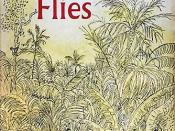GoldingÃÂs novel ÃÂLord of the FliesÃÂ is not a totally pessimistic novel; hence this is not the only reason that it was refused by so many publishers. It is evident that although it has strong pessimism throughout the text, it is not without a brighter side. Thus, pessimism could not be at fault for the publisherÃÂs lack of interest in the text as there are other grounds for their judgment.
The Oxford English dictionary defines pessimism as:1.lack of hope or confidence in the future.
2.a belief that this world is as bad as it could be or that evil will ultimately prevail over good.
So is Lord of the Flies a totally pessimistic novel? Well judging by the definition of ÃÂpessimismÃÂ, this theme is indeed strongly evident throughout the text, yet it is a far cry from being totally pessimistic as such. The novel explores mankindÃÂs potential for evil as it illustrates a number of irresponsible, malicious and violent acts performed by mere schoolboys due to the situations in which they are placed in.
ÃÂMaybe itÃÂs only us . . .ÃÂ Says Simon as the idea of the ÃÂbeastieÃÂ being only the darkness within one another hits him. Though almost every character becomes a ÃÂsavageÃÂ (as Golding describes them), some characters represent the better aspects of human nature. Ralph represents democracy and order as he is put in power by a democratic vote, attempts to please the majority and has his eyes set upon the boysÃÂ salvation off the island throughout almost all the novel. Piggy represents logic and intelligence as he is thought of the ÃÂthinkerÃÂ and is arguably the most rational boy in the group. Simon represents natural goodness as he is the only character to continue doing ÃÂwhat is rightÃÂ whilst all the other boys fall into...


